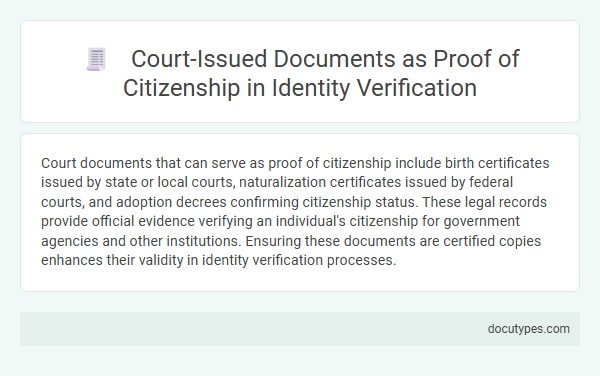Court documents that can serve as proof of citizenship include birth certificates issued by state or local courts, naturalization certificates issued by federal courts, and adoption decrees confirming citizenship status. These legal records provide official evidence verifying an individual's citizenship for government agencies and other institutions. Ensuring these documents are certified copies enhances their validity in identity verification processes.
Introduction to Court-Issued Documents in Identity Verification
Court-issued documents play a crucial role in verifying citizenship during identity checks. Understanding which specific court records are accepted can streamline your identification process.
- Birth Certificates - Official court-issued birth certificates serve as primary proof of citizenship by documenting your place of birth.
- Naturalization Records - Court documents confirming naturalization legally establish citizenship status after immigration.
- Adoption Decrees - These legal documents issued by courts can provide evidence of citizenship, especially for individuals adopted from foreign countries.
Legal Significance of Court-Issued Documents
Court-issued documents hold significant legal weight when proving citizenship. These documents serve as authoritative evidence to establish your legal status.
Examples of court documents that can prove citizenship include naturalization certificates, adoption decrees, and court orders confirming citizenship status. Such records are issued by authorized courts and are recognized by government agencies. Their legal significance lies in their ability to verify identity and citizenship in official matters.
Types of Court-Issued Documents Recognized as Proof of Citizenship
| Type of Court Document | Description | Use as Proof of Citizenship |
|---|---|---|
| Adoption Decree | A legal document issued by a court that finalizes the adoption of a minor. This decree often includes information regarding nationality status conferred upon adoption. | Recognized as evidence of citizenship when the adoption confers derivative citizenship under U.S. law. |
| Declaratory Judgment of Citizenship | A court decision formally establishing an individual's U.S. citizenship status, often used when citizenship status is unclear through other documents. | Serves as official proof confirming an individual's citizenship by judicial decree. |
| Naturalization Certificate Issued by Court | A certificate granted by a court after naturalization proceedings, documenting the grant of U.S. citizenship. | Widely accepted as primary legal evidence of U.S. citizenship. |
| Order of Legitimation | A court order establishing the legal relationship between a child and parent, which may impact the child's citizenship status. | Accepted when it directly affects citizenship recognition or status. |
| Certificate of Citizenship Issued by Court | Judicial certificate delivered as proof of citizenship, often by a state or federal court. | Functions as direct proof when issued under authority certifying citizenship status. |
Distinction Between Court-Issued and Government-Issued Documents
Court documents can sometimes serve as proof of citizenship, but it is crucial to distinguish between court-issued and government-issued documents for legal validity. Understanding this difference helps ensure your documentation meets official requirements.
- Court-Issued Citizenship Orders - These documents are issued by a court and confirm citizenship usually through naturalization or a citizenship declaration.
- Government-Issued Birth Certificates - Official birth certificates are issued by government agencies and are primary proof of citizenship.
- Legal Acceptance - Government-issued documents are more widely accepted as proof of citizenship, whereas court-issued documents may require additional validation.
Common Scenarios Requiring Court-Issued Proof of Citizenship
Court documents that serve as proof of citizenship include naturalization certificates, citizenship orders, and court-issued birth certificates. Common scenarios requiring such documents involve applying for a U.S. passport, obtaining a state-issued ID, or verifying citizenship status during immigration processes. You may need these court-issued proofs when other primary documents are unavailable or lost.
Verification Process for Court-Issued Documents
Which court documents can serve as proof of citizenship? Court-issued birth certificates and naturalization records are primary documents accepted for citizenship verification. Your verification process involves submitting certified copies obtained directly from the relevant court to authorities.
Challenges in Accepting Court-Issued Documents
Court documents can sometimes serve as proof of citizenship, but there are significant challenges in their acceptance. Understanding these challenges is crucial when submitting legal evidence of your citizenship status.
- Variability in Document Types - Courts issue different documents, such as birth certificates, adoption orders, or naturalization records, but not all are universally recognized as proof of citizenship.
- Authenticity Concerns - Verification of the legitimacy of court-issued documents can be difficult due to potential forgeries or outdated record-keeping practices.
- Jurisdictional Differences - Acceptance of court documents as proof varies by jurisdiction, with some authorities requiring additional documentation or validation.
Careful review of the specific court document and relevant legal criteria is essential before relying on it as proof of citizenship.
Security Features and Authenticity Checks
Court documents such as naturalization certificates, birth-in-court orders, and citizenship affidavits can serve as proof of citizenship. These documents incorporate security features like watermarks, raised seals, and unique serial numbers to prevent forgery. Authenticity checks often include verification through government databases and expert examination of document materials and inks.
International Perspectives on Court-Issued Citizenship Documents
Court documents such as birth certificates, naturalization certificates, and citizenship decrees commonly serve as proof of citizenship across various countries. These official records are issued by authorized judicial bodies to confirm an individual's nationality status.
In the United States, naturalization certificates issued by federal courts provide legal evidence of citizenship. European countries often recognize court-issued citizenship rulings in cases of judicial nationality acquisition or reinstatement.
Which Court Documents Can Serve as Proof of Citizenship? Infographic

